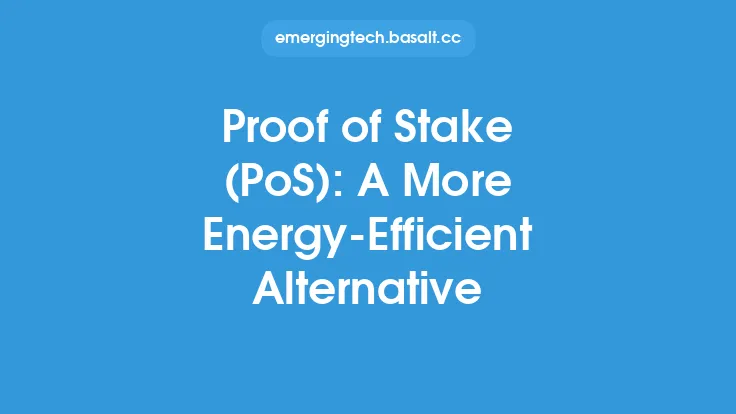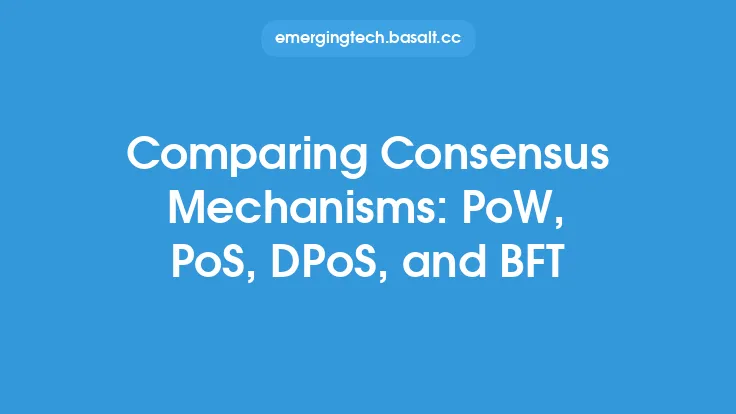Delegated Proof of Stake (DPoS) is a consensus mechanism that has gained significant attention in the blockchain space due to its ability to facilitate faster transactions and higher scalability. This mechanism was first introduced by Dan Larimer, a well-known blockchain developer, and has since been implemented in various blockchain platforms, including EOS, TRON, and BitShares.
How DPoS Works
In a DPoS system, users vote for validators, also known as witnesses or delegates, to secure the network and validate transactions. These validators are responsible for creating new blocks and adding them to the blockchain. The validators with the most votes are chosen to create blocks, and the frequency at which they create blocks is determined by the network's block production schedule. The voting process is typically done through a token-based system, where users can vote for their preferred validators using their tokens.
Key Components of DPoS
There are several key components that make up a DPoS system. These include:
- Validators: These are the nodes responsible for creating new blocks and validating transactions. They are chosen through a voting process and are typically required to have a certain amount of tokens staked as a guarantee of their integrity.
- Voting: This is the process by which users choose their preferred validators. The voting process is typically done through a token-based system, where users can vote for their preferred validators using their tokens.
- Block Production: This is the process by which validators create new blocks and add them to the blockchain. The frequency at which blocks are produced is determined by the network's block production schedule.
- Token Holders: These are the users who hold tokens on the network and have the ability to vote for validators.
Benefits of DPoS
DPoS has several benefits that make it an attractive consensus mechanism for many blockchain platforms. Some of the benefits include:
- Faster Transaction Times: DPoS allows for much faster transaction times compared to other consensus mechanisms, such as Proof of Work (PoW). This is because validators are chosen in advance and can create blocks at a much faster rate.
- Higher Scalability: DPoS is more scalable than other consensus mechanisms, such as PoW, because it allows for a higher number of transactions to be processed per second.
- Lower Energy Consumption: DPoS is more energy-efficient than PoW, because it does not require the use of powerful computers to solve complex mathematical equations.
- Improved Security: DPoS is more secure than other consensus mechanisms, such as PoW, because it requires a much larger amount of tokens to be staked in order to launch a successful attack on the network.
Challenges and Limitations of DPoS
While DPoS has several benefits, it also has some challenges and limitations. Some of the challenges and limitations include:
- Centralization: DPoS can lead to centralization, because a small group of validators can control the majority of the network's voting power.
- Voting Manipulation: DPoS is vulnerable to voting manipulation, because users can be incentivized to vote for certain validators in exchange for rewards or other benefits.
- Regulatory Challenges: DPoS can be challenging to regulate, because it is not clear who is responsible for the actions of the validators.
Real-World Applications of DPoS
DPoS has several real-world applications, including:
- EOS: EOS is a blockchain platform that uses DPoS as its consensus mechanism. It is designed to support large-scale applications and has a high degree of scalability.
- TRON: TRON is a blockchain platform that uses DPoS as its consensus mechanism. It is designed to support the creation of decentralized applications and has a high degree of scalability.
- BitShares: BitShares is a blockchain platform that uses DPoS as its consensus mechanism. It is designed to support the creation of decentralized applications and has a high degree of scalability.
Conclusion
In conclusion, Delegated Proof of Stake (DPoS) is a consensus mechanism that has gained significant attention in the blockchain space due to its ability to facilitate faster transactions and higher scalability. It has several benefits, including faster transaction times, higher scalability, lower energy consumption, and improved security. However, it also has some challenges and limitations, including centralization, voting manipulation, and regulatory challenges. Despite these challenges, DPoS has several real-world applications, including EOS, TRON, and BitShares. As the blockchain space continues to evolve, it is likely that DPoS will play an increasingly important role in the development of new blockchain platforms and applications.





